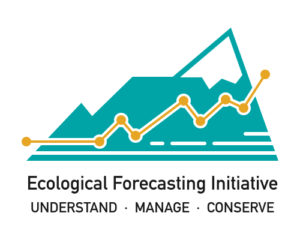Ecological forecasting is a diverse emerging discipline combining ecological theory, advanced computational and statistical techniques, and social science methodology to develop accurate, useful predictions of how ecological populations, communities, and ecosystems will change in the future.
In the McLachlan lab, we participate in the Ecological Forecasting Initiative (EFI), a grassroots organization with the aim of building a community around the theory, methods, and practice of ecological forecasting. Jason is a founding member of EFI and is chair of the Education Working Group and co-chair of the Diversity, Equity, and Inclusion Working Group. Jody is the program manager. In the McLachlan lab, we specifically focus on forecasting coastal salt marsh accretion (see our Salt Marsh Ecosystem Dynamics research page) and forest community composition and carbon storage over decades to millennia (see our PalEON: PaleoEcological Observatory Network research page). We are also involved in EFI’s Education and Diversity, Equity, and Inclusion Working Groups, where we are working on 1) identifying and filling gaps in the existing educational resources for undergraduate and graduate students in ecological forecasting, and 2) engaging with underrepresented students in STEM to promote participation in data-driven scientific fields.
The McLachlan lab and EFI emphasize the importance of participation and training of BIPOC and other underrepresented groups in STEM. We have the unique opportunity to build the ecological forecasting discipline and community with a specific mind toward BIPOC representation. We focus specifically on diversity, equity, and inclusion in the context of undergraduate and graduate education. We are focusing on making connections with instructors and students from minority-serving institutions with the ultimate goal of identifying specific challenges to obtaining training in ecological forecasting and collaboratively working towards solutions. We are also leading efforts in EFI to develop ecological forecasting educational resources using inclusive pedagogy principles. We strongly believe that working with underrepresented groups is the starting point for making the discipline of ecological forecasting more accessible while also helping us to engage with diverse perspectives and diversify our teaching strategies.

